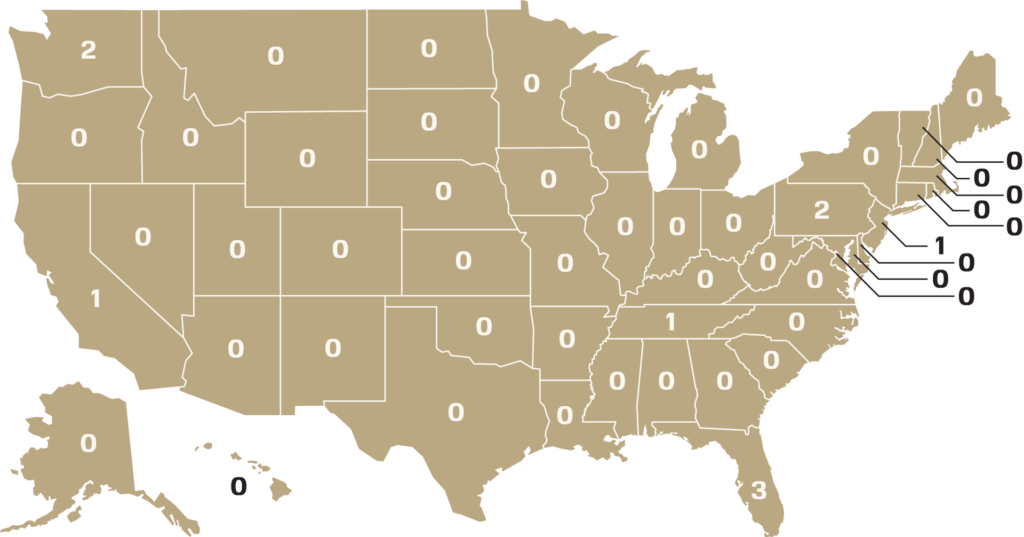Racist skinheads have long been among the most violent-minded elements of the white power movement. During the 1980s, 1990s and the mid-2000s, particularly, the movement rose to prominence through the lucrative, international hate music scene. The movement has shrunk steadily since.
Top Takeaways
The racist skinhead movement’s influence within the broader white power network has been steadily waning, exacerbated by its inability to recruit younger members. Platforms like Facebook remain the preferred social media space for individual skinheads, reflecting the aging demographic of the movement. Conversely, active skinhead groups tend to favor platforms such as Telegram and VK, where they engage with a more insular audience.
New racist skinhead groups are exceedingly rare, typically forming from remnants of existing organizations, and no group is attracting recruits in significant numbers. Many former leaders have transitioned to other far-right factions, including the Proud Boys, which emerged in alignment with the social movements surrounding President Donald Trump. The movement’s persistent struggle to organize effectively online has further hastened its decline, leaving it increasingly fragmented and less relevant in 2024.
Key Moments
Despite the death of Don Hansard, the Vinlanders Social Club (VSC) and its offshoot, Firm 22, remained active throughout 2024. Both maintained an online presence, with active websites and regular engagement on social media. The Atlantic City Skins (ACS), ironically more active in Tennessee than New Jersey this year, continued to promote white nationalist themes through platforms like Telegram. A Telegram channel, White Noise Radio, operated by ACS TN Joshua Matthew “JD” Croom Williamson, frequently spotlighted hate music bands and other skinhead groups like VSC and Firm 22.
While most listed skinhead groups retained an online presence on platforms like Facebook, Telegram, or VK, their activity was inconsistent. Vinland Clothing continued to operate its website, selling merchandise, but its Instagram and Telegram accounts showed no updates after May 2024. On the music front, the American Defense Skinheads’ band, Birthrite, released a new album, showcasing that hate music remains a key cultural touchstone for the movement.
What’s Ahead
The racist skinhead movement is poised to face continued challenges in maintaining relevance within the far-right ecosystem, primarily due to its aging demographic and failure to recruit younger members. While some groups and hate music promoters are attempting to network internationally with racist skinhead factions in Europe, Chile and Mexico, these efforts are unlikely to reverse the movement’s overall decline. As white nationalist groups with polished public images and militant neo-Nazi organizations attract younger extremists, the racist skinhead movement’s influence will likely diminish further.
Background
Since its emergence in Britain in the early 1980s, the racist skinhead movement has existed to promote and enact hate violence. In November 1988, three racist skinheads in Portland, Oregon, beat Ethiopian student Mulugeta Seraw to death with baseball bats. In April 1999, three racist skinheads murdered Mexican immigrant Irineo Soto Aguilar in Lakeside, California, crushing his skull with chunks of concrete. In October 2007, a racist skinhead strangled a 62-year-old gay man in Oklahoma City as a rite of passage in his gang. In 2012, a racist skinhead attacked worshippers at the Sikh Temple of Wisconsin in Oak Creek, Wisconsin, killing seven people who were preparing the day’s communal meal. These tragedies and similar acts of violence inflict lasting trauma on families and communities.
Some police departments now have bias-crime detectives, with many focused on local threats racist skinhead crews have posed. Racist skinheads have also become a regular element in prisons and juvenile corrections facilities, further exemplifying the central role bigotry plays in shaping our criminal justice system. The U.S. military also has had to contend with racist skinheads in its ranks. Hate music from racist skinhead bands resulted in movement leaders such as William Pierce making millions of dollars. The hate music scene in this country has always maintained a nearly symbiotic relationship with racist skinheads, and the two have dwindled in some ways together.
Racist Skinhead Terms
2024 Racist Skinhead Hate Groups

AC Skins
Atlantic City, New Jersey
Tennessee
American Defense Skinheads
Pennsylvania
American Front
Washington
Firm 22
Florida
Keystone United
Pennsylvania
Northwest Hammerskins
Seattle, Washington
United Skinhead Nation
Florida
Vinland Clothing
California
Vinlanders Social Club
Florida


